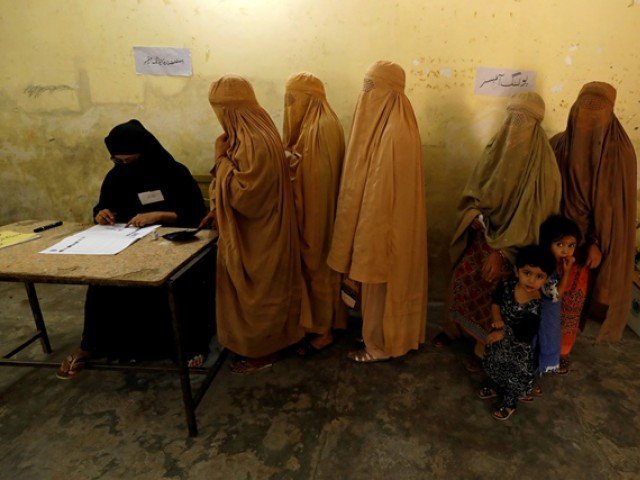
Working from home: Basic rights denied
Most women in Pakistan work. They are brave, tough and continue to work despite hazardous conditions and oppression.
Contrary to popular perception, most women work in Pakistan, and often inside the home in the informal economy. Sixty-five per cent of the female workforce works at home, and a 2009 survey estimated their number to be 8.52 million, although activists suggest it may be as high as 12 million.
These workers are not protected by formal labour laws and suffer the legal and social disabilities that are typically associated with this form of work - no rights to minimum wage, no social security benefits, inability to organise in unions and lawfully challenge violations of occupational health and safety (OSH) laws.
Home based workers (HBWs) do piece rate work which means they get paid for the number of items they complete. Often it is seasonal. Bangle work, for example, is in high demand before the two Eids, and this offers what Zehra Khan of the Home Based Women Workers Federation (HBWWF) calls a short time frame to negotiate higher rates from middle men and contractors. Otherwise, HBWs are overly dependent on middle men who exploit their lack of market access and limited mobility, and hire them for the lowest possible wages without regard to the potentially hazardous nature of the substances used in their work. Because they can.
A backward race
These women though, are brave and tough and often feel they can win the race of piece rate work, and build towards a dowry.
HBWWF General Secretary, Zehra Khan says it is a backward race - in time, their health deteriorates, rates are degrading and the government places remuneration at one third of minimum wage. Workers can cite numbers that would boggle the mind in light of inflated food prices - Rs9 for 1,000 incense sticks or Rs3 for one shalwar. Thus, it is optimistic to think they can make a profit, let alone a living wage. The odds are against them, and unless HBWs come together and form effective collective bargaining units, industrialists will continue to exploit them to maximise profits, and they'll be nickled and dimed into oblivion.
Women conduct all types of work at home, and become experts in some area - they cut, crop, shred garments, and stitch pants and shirts. They make incense sticks - they mix chemicals, dry the sticks, and then paste. With children, they de-vein and peel shrimps and pack them. They glue jewels to bangles, make beedis, and weave carpets.
Hazardous conditions
Working conditions are less than ideal. They squint under poor light, bend and crouch for long periods, and use chemicals that are probably dangerous. Organisers too are often unaware of the exact nature and long term effects of these chemicals and identify them through the symptoms suffered by the women - skin diseases, lung infections, and jaundice.
Home based work is done by women from all ethnicities, be they Bengali and Sindhi women of Rehri Goth associated with fisheries or Punjabi and Urdu speaking women of Akhtar Colony or Gadap Town in Karachi.
While home based work is one of the sources of women's economic oppression, formal employees are only slightly better off. Factory owners will hire them as contract, temporary or contingent workers in order to avoid paying social security benefits. And because these workers are not issued employment letters, like home based women workers, they cannot access the labour courts which require that you first prove an employment relationship to assert a cause of action against the employer. And, if they can prove their status, labour courts are painstakingly slow, and susceptible to bribery by employers who wield greater power. Encroaching further on workers' rights are exports processing zones that entice multinationals to do business in Pakistan by selling the pliable (and exploitable) nature work force that is disallowed from legally unionising or going on strike.
This top to bottom system of semi and full informalisation of the workforce where industrialists, both local and multinational, are given an unconditional guarantee of a ready, able and willing body to do the work ensures them a higher profit margin at the peril of the entire community.
Labour laws implementation: Easier said than done
It is a small step in the right direction that the Labour Ministry is consulting and procuring feedback in order to develop a national policy on home based workers. The policy aims to accord home based workers legal status and equality in relation to others doing the same work, provide them with marketing opportunities, skills training, occupational safety and health, permission to form unions and bargain collectively, and would mandate middlemen and subcontractors to enter into written contracts with the workers. It articulates a plan to ratify the ILO Convention on Home Work, C177 which requires governments to accord HBWs protections.
However, the policy does not question whether work, especially hazardous work, should be conducted at home at all, considering that most informal work is done in two room homes in slums.
The policy specifies that the:
"tendency to forcibly bring HBWs to designated working centres in urban or peri-urban areas will be discouraged."
A laudable goal as any forced transportation of workers sounds tyrannical. But, this does not address the default where congested homes, where occupants suffer high incidences of infectious diseases such as Tuberculosis, are converted into factories and work stations, where women work, cook, and care for children all at once, compounding the health risks.
Indeed, it defines a HBW as a person who works within the home boundaries or in any other premises of his/her choice. Arguably, work at home helps women who would otherwise not have employment. But then the policy needs to be explicitly worded about safeguards from noxious substances. At this stage, it is rather rudimentary and toothless, and perhaps more will come at the planning, implementation, and enforcement points.
The government claims, in what appears half hearted, that they:
“shall endeavour to convince large, medium and small industry owners and business owners, employers and their intermediaries to ensure the home-based workers’ right to health and occupational safety.”
At a later stage, the government plans to:
“upgrade homes in order to make them more hygienic, safe, and comfortable.”
This sounds like an easier said than done proposition. If the government were really serious about it, then this would imply upgrading not just homes, but katchi abaadis and their crumbling infrastructure altogether, and working with yet another set of middle men who provide essential services to informal (and often illegal) settlements. It is a massive undertaking, and the casualness of its insertion into the proposed labour policy implies a rather limited conviction to the process.
Humaira, an ex garment union organiser and activist with Women and Development Association (WADA) talks of a plan to build work centres in communities where HBWs would come without coercion with nearby daycare centres staffed by professionals. She is not convinced that legislation is the answer as laws need enforcement. She says that workers have not realised their current rights under the law, and new law will not make a difference. Litigants will have to take cases to labour courts and the High Court to demand implementation, and this would require time, commitment, and resources and women who are already confined to home based work would have to rely on men in their families to push their cases.
There is no systematic practice of public interest labour law practice which could facilitate this process. In 2006, lawyer Faisal Siddiqui, worked with WADA families and helped settle a case for the plaintiffs who had suffered serious burns from the toxic waste that a factory had illegally dumped in the SITE area of Karachi. One child died, one’s legs had to be amputated, and twenty others were injured. This is WADA's one legal success story though workers rights should not turn on individual benevolence and philanthropy rather than systems. Generally, there is no joint, ongoing collaboration between NGOs and progressive lawyers to build pressure on employers through strategic labour litigation.
Implausible suggestions in policy
The national policy also envisions having employers pay social security for home based workers including health-care, pension, disability, and maternity benefits. However, it does not tackle a fundamental issue. The relationship between middlemen and workers is casual, transient, and flexible; often there are multiple middle men and sources of work behind the middle man. These sources could be factories, independent manufacturers and/or exporters. The policy would define an employer as a natural or legal person (corporation) that:
“directly or through intermediaries gives out home based work in pursuance of their business activity.”
It could also be:
“a person who can be an owner, sub-contractor, agent or middleperson, irrespective of who provides the materials, equipment or other inputs used by a home-based worker.”
In a litigious society, such a broad definition would have middle men and industries doing cartwheels trying to pass the responsibility.
Who is ultimately the employer - the one who could be held down to the promise of social security payment?
Understandably, the policy is simply a statement of principles and objectives. Future plans and laws should address some of the practical complexities of interpretation and enforcement.
Work done by WADA, HBWWF and others
Organisers have made interventions. The Home Based Women Workers Federation organised reproductive health clinics. Zehra Khan underscored the level of ignorance in the communities. As an example, she mentions the inappropriate use of Dettol for personal hygiene, and the lack of knowledge about diseases. Local units of the HBWWF will occasionally arbitrate on behalf of the worker with the middleman, and negotiate higher wages, albeit these will still be lower than what they should be paid under minimum wage laws. They mediate in domestic disputes, and bring people together to fix a neighborhood problem, a blocked gutter, or cases of sexual harassment. The units participate in facilitated study sessions.
Impressively, on April 11, 2011, the HBWWF and the Labour Education Foundation (LEF) filled almost every seat at the Karachi Arts Council at their home based workers conference. Most of the women had been bussed in. Yet, their presence was formidable, and perhaps provided the politicians present (Sindh Labour Minister Amir Nawab and Sindh Women Development Minister Tauqeer Fatima) with the visual they needed - a hall filled with working class women and children supporting their national policy on home based workers. In turn, it provided women workers with a social and politicising opportunity.
WADA and HBWWF both complain about the lack of market alternatives for the home based workers. In fact Sapna Joshi, an Indian delegate working with a South Asian regional alliance of HBWs, HomeNet, highlighted effective marketing as the number one obstacle to women’s economic empowerment. Writer Zofeen Ebrahim gives the example of a worker who gets Rs20 to Rs50 for every one dozen girl’s dresses she stitches.
She quotes the worker:
"I know I’m getting very little because the same dress is sold for 200 rupees by the factory to a retail shop. I saw the label myself just before it was being packed and sent off.”
Women can't market their products directly; yet, frustratingly, they are cognizant of the real value of their work to consumers. WADA tried a system where one of their organizers agreed to place the products in the market for the HBWs thus replacing the middle man. Although well intentioned, he had to abandon the project when storekeepers refused to pay advances for the pants, and it wasn't feasible for the HBWs to wait indefinitely for returns on meagre capital. The bundles of unsold clothes were sitting in some back shelf in their office waiting for a better idea.
HBWWF, though, is a bit more ambivalent about embracing the role of marketer. They are more explicitly leftist, and explain that there is a risk of becoming an exploitative middle-man. They cite examples of NGOs that market products for home based workers, but end up retaining a big chunk to run their own enterprise. HBWs usually end up unhappy subsidising the enterprise.
What is a fairer alternative?
Is there a marketing model that works in tandem with the battle that home based workers must necessarily wage to rise above the oppressive system completely - a battle that necessitates an ideological rejection of privatization and capital friendly globalization and strengthens home based workers’ unions towards a larger movement?
Hold the government accountable
The National Policy does not have clear plan either. They mention an affirmative action policy, quite nobly, where the public sector will purchase non-industrial handicraft goods from home based workers - thus cutting out the middle-man, and that various ministries would work together on the marketing issue. Ambitiously, they announce, they will push “OECD countries for preferential or zero tariffs on the South Asian HBWs” products collectively in order to protect the communities of home-based workers “from the demerits of the globalization.”
The policy states that:
“federal and provincial governments shall set up inter-ministerial and cross-sectoral autonomous bodies to put their policy into action.”
However, since the wheels of the justice, the legislature, and administration turn slowly, it may take a while for HBWs to receive actual social security benefits, employment cards, and to realize the impacts of protectionism. The way forward for HBWs is to hold the government to their promises, and to build the unions, and bring these unions under the fold of intercity and province federations as the HBWWF has done with three unions in Hyderabad and Karachi, and in Balochistan.
The key is to build local bodies and mechanisms for workers to directly negotiate for better rates, demand full disclosure of all chemicals used in processes and safe practices, use the courts and police as a stick, and explore economic alternatives to the middle man. Communities that are economically disempowered need immediate solutions as well as long termed ones - access to markets, education, healthcare, and awareness around health and safety.
Unions must go viral
While many organisations are working with home based workers (HBWWF and WADA are just two), organisers are guarded about their work and there seems little cohesion or non tokenist leadership amongst the HBWs.
NGOs obviously cannot cater to 12 million HBWs. Inevitably, unions must go viral and do movement building, shut down shops, use seasonality to their advantage. Leadership must evolve. A dependence on donor funding for the work should cease. Workers in different informal sectors (fisherfolk, domestic workers, and home based workers) must demonstrate solidarity with one another. Unity must also be forged between the formal sector and the non home based informal sector. At the home based workers convention, the National Trade Union Federation extended its full support to home based workers' unions - a good gesture.
There is a world to win, but not without workers seeing the commonalities of their oppression.




COMMENTS (4)
Comments are moderated and generally will be posted if they are on-topic and not abusive.
For more information, please see our Comments FAQ